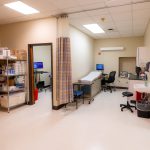We asked Dr. Deepa Burman, medical director of the UPMC McKeesport Portable Sleep Study Program, about symptoms and treatment methods for sleep apnea – a serious sleep disorder that occurs when airways are obstructed during sleep.
What is obstructive sleep apnea?
A. Sleep apnea refers to interrupted breathing during sleep. Obstructive sleep apnea is the most common form of sleep apnea. It is a serious disorder that causes the throat to close until airways become blocked and breathing gets interrupted or stops for a varying amount of time during sleep. This may decrease oxygen supply to the brain, causing people to wake up multiple times in the middle of the night.
What are some common symptoms and effects?
A. Common symptoms are breath pauses, frequent snoring and choking or gasping sounds during sleep. Those who suffer from sleep apnea often feel fatigue throughout the day and, in some cases, people will unintentionally fall asleep at undesired times. The lack of sleep causes people to wake up feeling unrefreshed and with morning headaches. Untreated sleep apnea can worsen and in some cases result in medical problems including high blood pressure, diabetes, stroke and depression.
How do you know if you have sleep apnea?
A. In addition to having the symptoms and medical problems mentioned above, a sleep study is used to diagnose sleep apnea. In the past, a sleep study was only able to be conducted with an overnight stay in a sleep laboratory, but some patients had trouble sleeping in a new environment during the inpatient sleep study. Recent technological advances have made it possible for people to take the sleep study tests at home. This new form of testing is more convenient, cost effective and accessible to the public.
To participate in an at-home sleep study, patients simply pick up equipment at the hospital and are taught how to hook it up at home. The next morning, they return the equipment and the board-certified sleep medicine experts read the data to determine if sleep apnea is the cause of the sleep issues. Sleep apnea is a serious but easily treatable disorder, so people experiencing symptoms should contact their primary care provider.







